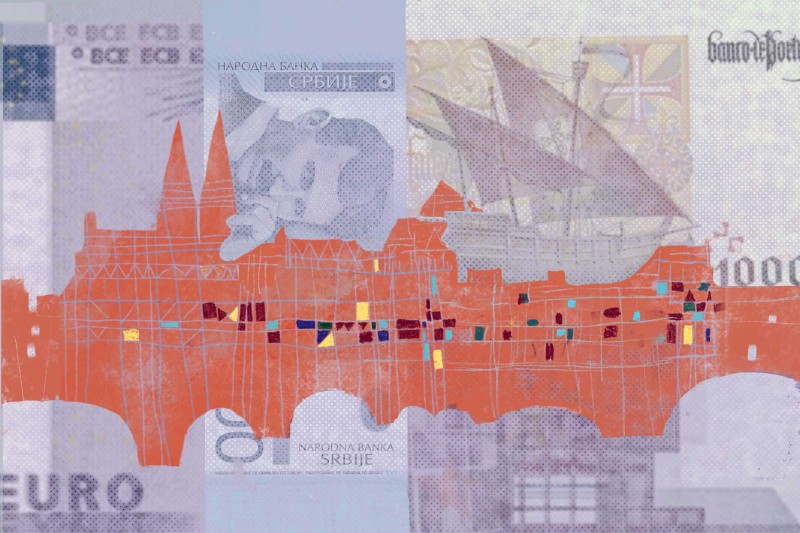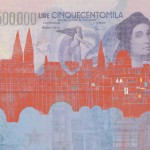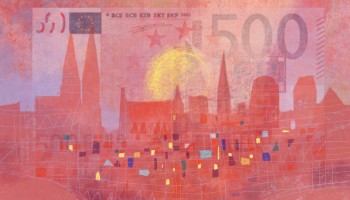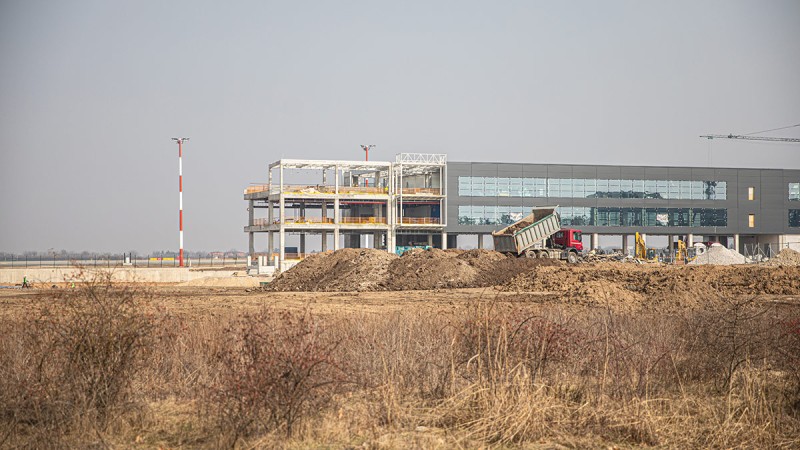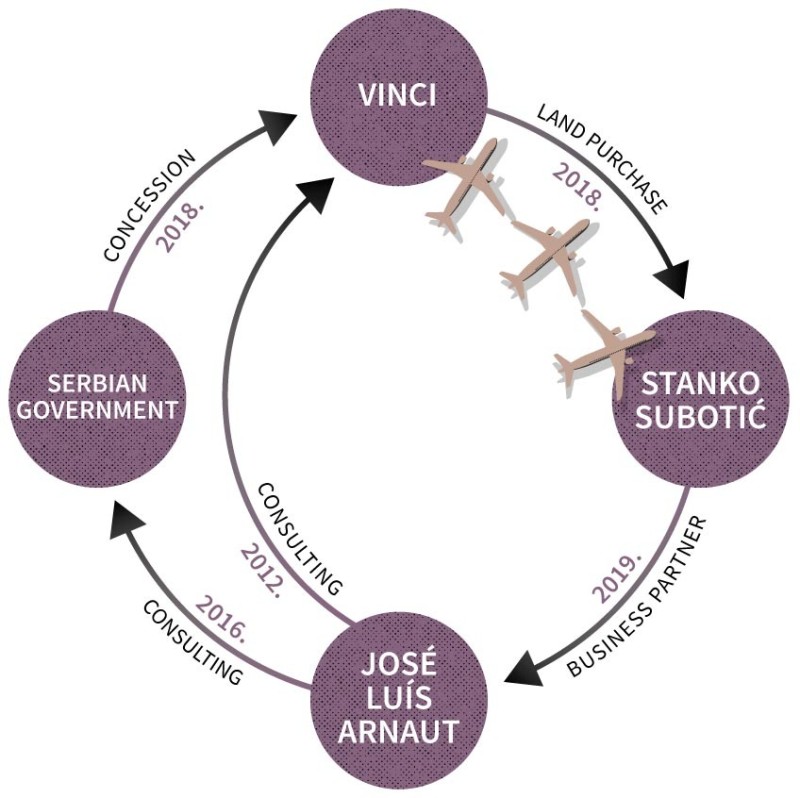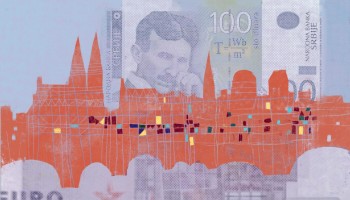When French construction giant Vinci won the rights to operate Belgrade’s Nikola Tesla Airport in early 2018, President Aleksandar Vučić called it a “big deal for Serbia.”
“This is a thing that will strengthen our creditworthiness and bring us more investors,” he said at a press conference to tout the deal, which was backed by a loan from the European Bank for Reconstruction and Development.
“The airport will look much better than it looks now.”
Vinci paid just over half a billion euros for the rights to run the busiest airport in the Western Balkans for 25 years. The French firm also promised to spend another 732 million euros to upgrade the facility, including a major expansion to more than double its passengers to 15 million annually by the end of the concession period.
But the “big deal for Serbia” was also a big deal for wealthy businessman Stanko Subotić, who profited handsomely from land he owned near the airport.
KRIK and OCCRP previously reported that Subotić was poised to reap benefits from the new construction, but new information obtained by reporters shows that he earned far more than initially projected. Vinci paid 47 million euros for two parcels of land owned by a Subotić firm — more than four times higher than projected in a secret internal government report.
What’s more, within a year of selling the land, Subotić went into business with a former Portuguese politician whose law firm advised Serbia’s government on the airport deal, KRIK and OCCRP have learned. That firm, CMS Rui Pena & Arnaut, had also been an adviser to Vinci in Portugal.
In 2016, when the Serbian government was still deciding what to do with the state-run airport in Belgrade, it hired CMS Rui Pena & Arnaut as part of an advisory team led by a French consulting company. The group recommended that the Serbian government seek a concession deal, and drafted a feasibility study for the agreement. Vinci signed the concession agreement in March 2018, and set about arranging to buy Subotić’s land.
The land sale was finalized in December 2018. Then, at some point in 2019, Subotić became partners in a real-estate company with one of the law firm’s managing partners, José Luís Fazenda Arnaut, a former deputy prime minister of Portugal, newly available corporate ownership data from Luxembourg reveals. It is unclear how the two men knew each other.
“Now that we have all pieces put together, it of course raises suspicion of a connection between Subotić, the government of Serbia, and this law office,” said Zlatko Minić from Transparency Serbia. “The question is whether Vinci is also connected in this deal or they found themselves in a situation in which they could not choose.”
Arnaut initially denied having set up a company with Subotić, but later confirmed he was an investor in their joint venture, Vanguardlevel, which he said was for “opportunistic investment” in real estate. He dismissed the suggestion that there was any conflict of interest at play, saying he was not part of the team from his law firm that advised on the airport deal.
Vinci said the company bought the land from Subotić because it was needed for the airport expansion, and said the final deal took into account the “privileged situation” of the sellers. The company dismissed questions about the disparity between the price Vinci paid for the land and the government advisers’ estimate.
“Comparing their price per square meter to that of other plots of land is not relevant,” the company said.
Subotić’s lawyer, Antoine Vey, declined to answer specific questions on the matter, but said: “Stanko Subotić will not hesitate to use any legal means to defend his interests, as he has done in the past.”
“The Price Is Shocking To Me”
Subotić, who before the global financial crash was one of the 100 richest people in Central and Eastern Europe, was the largest private owner of land around Nikola Tesla Airport when Vinci won the concession to expand it.
Originally, Serbian airport authorities planned to build the expansion on 28 of Subotić’s 112 hectares. A document obtained by KRIK and OCCRP shows a government advisory group estimated in 2016 that land in the area would cost 100 euros per square meter, meaning Subotić would reap some 28 million euros.
After the concession deal, Vinci ended up buying less than 11 hectares of Subotić’s land — but paid 47 million euros for it, or 436 euros per square meter, according to a financial statement from the company through which Subotić owned the land.
That price tag is also nearly double the airport’s own valuation of the land. Its financial report for 2019 estimated the two parcels owned by Subotić were worth just 25.4 million euros.
“The price is shocking to me,” said Minić from Transparency Serbia.
Vinci said it started negotiations to buy Subotić’s land in 2017, while it was still bidding for the airport concession, and completed the deal a year later, after it had won the tender.
Vinci said it dealt with Subotić because it needed his land. “The sale price of the plots of land was the result of a seller/buyer negotiation taking into account their privileged situation,” the statement said. “These plots were necessary for our optimal technical and operational solution for the development of the airport.”
But not all the bidders took the same approach. Zurich Airport’s competing bid for the concession proposed building in an area that did not seem to include Subotić’s land.
A Successful Purchase
Before advising the Serbian government on its airport, CMS Rui Pena & Arnaut had also consulted for Vinci. Arnaut personally helped the French company negotiate its successful 2013 purchase of the state-run Aeroportos de Portugal (ANA), which controls 10 airports in Portugal.
ANA became a subsidiary of Vinci Airports, and the Portuguese politician was appointed chairman of its board on January 4, 2018 — the day before Vinci was awarded the Serbian airport concession.
Lawyer, Consultant, Politician
Pressed on whether his ties to Vinci created a conflict of interest in Serbia, Arnaut said he was never part of the legal team that advised on Nikola Tesla Airport.
“I personally never provided services to the Serbian Government in my career,” he said, adding that “Chinese walls” set up within the law firm meant that “sensitive information relating to the Belgrade Airport project was kept within the team allocated to it.”
Vinci said that Arnaut told them he did not advise Serbia’s government on the airport deal.
“Mr. Arnaut had no influence whatsoever on the decision” to award the tender to Vinci, it said.
At some point in 2019, Subotić and Arnaut became partners in a real estate company called Vanguardlevel, which had been set up in March that year in Portugal by a company Arnaut controls, Platinumdetails.
Data from Luxembourg’s register of ultimate beneficial owners (UBOs) shows Subotić owns 90 percent of Vanguardlevel through his firm Emerging Markets Investments. Arnaut controls the remaining share through Platinumdetails.
Reporters have not been able to find any property owned by Vanguardlevel.
When contacted by a reporter, Arnaut first denied working with Subotić. “I don’t have businesses. I am a lawyer,” he said before hanging up the phone.
Later, when queried again by email about his links to the Serbian businessman, he backtracked. “Vanguardlevel was created for opportunistic investments in Real Estate, and I decided to participate in a minority position with my own funds as a financial investor,” he wrote to reporters.
“This company for the development of its investments resorted to financing as it is market practice. I still own this investment as the Real Estate market, as many others, has suffered greatly with the ongoing economic crisis thereby affecting the expected return on investment.”
Serbia’s government did not respond to a request for comment.
This is the second questionable deal that the OpenLux data has revealed involving Subotić, who was convicted by a Serbian court in absentia for smuggling cigarettes in 2011 but was later acquitted after a controversial retrial.
Subotić’s Ties to Darko Šarić
Arnaut did not respond to questions on how he knew Subotić, or whether he was aware of the Serbian businessman’s reputed ties to Šarić. However, he noted that Subotić had been acquitted of the charge of cigarette smuggling.
“As an individual and a lawyer, I strongly believe in the rule of law as a main principle of a democratic state and fully respect court decisions as a believer in justice and institutions,” he wrote.
Another OpenLux investigation found that last year, Subotić used a Luxembourg shell company to sell an airline to Nikola Petrović, a close associate of Serbia’s President Vučić.
The story offered the first documented evidence linking Subotić to the president's inner circle. Vučić has since hit back, saying he had never ridden on “buses, planes, or anything else” belonging to Petrović.
“He has always been rich,” Vučić told a reporter about Petrović, saying he had no knowledge of his friend’s business affairs.
Editor’s Note: Subotić has filed a lawsuit in a Swiss court against OCCRP, its editor in chief, and a KRIK journalist for a 2018 story on the possibility he might profit from the sale of the airport land.
